The latest Quarterly Update of Australia’s National Greenhouse Gas Inventory – which covers the period up to the end of December 2020 – shows that emissions are at the lowest level on record and 20.1 percent below 2005 levels, which is the baseline year for the country’s 2030 Paris Agreement target.
In the year to December 2020, emissions were 499.0 million tonnes – 5.0 percent or 26.1 million tonnes lower than in 2019, the Minister for Energy and Emissions Reduction, Angus Taylor, said in a statement.
When exports are excluded, domestic emissions are now 37.4 percent below 2005 levels.
Emissions from electricity generation continued their long-term structural decline in 2020, down 4.9 percent, or 8.7-million tonnes, relative to 2019.
Carbon capture facility in WA makes big contribution
Fugitive emissions also fell 8.8 percent or 4.8 million tonnes, with the ramp up of the Gorgon carbon capture and storage facility in Western Australia making a significant contribution. Fugitive emissions are accidental emissions of vapours or gases from pressurised apparatus, either due to faulty equipment, leakage or other unforeseen mishaps.
The Gorgon facility will permanently store around 4-million tonnes of carbon dioxide each year at full rate, making it the largest purely emissions-reduction facility of its kind in the world.
Covid-related restrictions on transport activity reduced emissions from that sector by 12.1 percent or 12-million tonnes. Land sector emissions were slightly higher over the year to December, the minister said.
“Investing in low emissions technologies will enable Australia’s continued success in meeting and beating our emissions reduction targets. Australia beat its 2020 target by 459-million tonnes and we are on track to meet and beat our 2030 Paris target,” Taylor stated.
Climate Council says it’s not the Government’s doing
“Over the last two years, the projected emissions reductions required to achieve that target have fallen by 639 million tonnes – the equivalent of taking all of Australia’s 14.7-million cars off the road for 15 years.”
But the Climate Council has hit back by accusing the Federal Government of attempting to take the credit for other people’s work and circumstances beyond its control.
“It is holding back progress on the scale and pace of emissions reductions we need,” council Senior Researcher, Tim Baxter, said.
“Electricity emissions declined due to state efforts to scale up renewable energy, while transport emissions decreased largely due to Covid restrictions. The Federal Government played no role in this.”








 Explore top-rated compensation lawyers in Brisbane! Offering expert legal help for your claim. Your victory is our priority!
Explore top-rated compensation lawyers in Brisbane! Offering expert legal help for your claim. Your victory is our priority! 

 "
"


